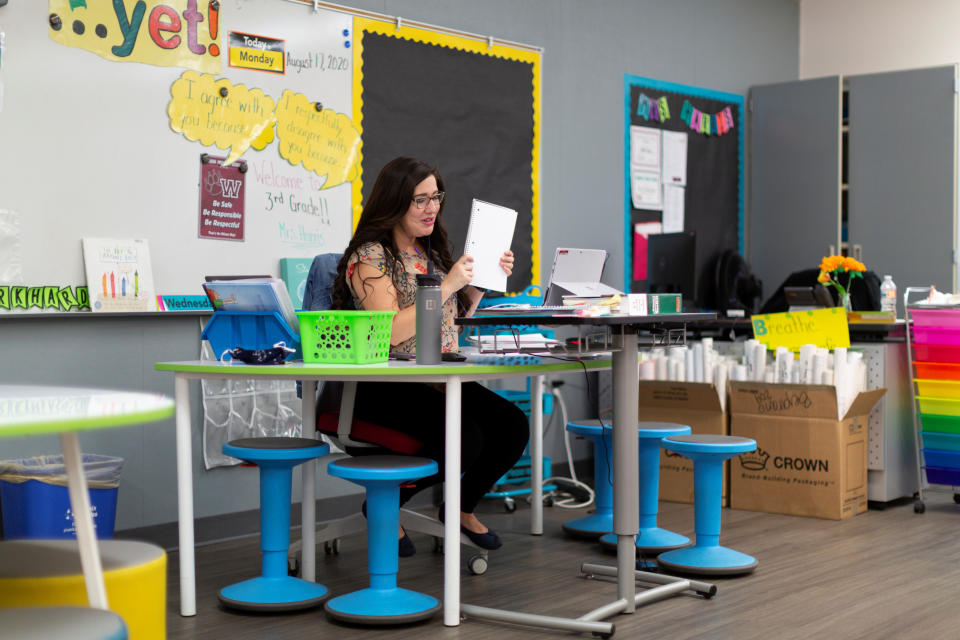More than 50% of parents expect to lose income when school starts: survey
With back-to-school season right around the corner, many parents are contemplating whether to send their children back to school or keep them at home due to the health risks of the coronavirus pandemic. And for parents who choose to keep their children at home over COVID-19 concerns, a staggering 54% say that they expect to lose up to half of their income, according to a new survey from Debt.com.
According to the survey, less than 10% of parents said they were “not worried at all” about their children’s health if they go back to school while 50% said they were “very worried.”
Fears of sending children back to school are common, surveys are finding.
A survey of parents from Care.com found that coronavirus impacted the childcare plans of more than 8 in 10 families. Almost two-thirds of respondents who use daycare are somewhat or very uncomfortable returning their children to the facilities.
Childcare has always been a major expense for parents of young children and is cited as the top-ranking unexpected cost by new parents, followed by diapers and formula, the Care.com survey found.
Over half of American families spend at least $10,000 annually on childcare. Currently, it’s cheaper to pay for your teenage child to attend college than it is daycare — the average annual cost of in-state college tuition is $9,410, according to College Board.
Stay at home?
But as the pandemic continues, parents are finding that there are also big financial implications to staying at home with their children.
Over 50% of the parents surveyed by Debt.com expect to lose anywhere from 11% to 51% of their income once school begins. This leaves a great concern that households will bridge the gaps in income with credit card debt.
"Last year, before the pandemic, the average American family was carrying $137,000 in debt. Although that includes mortgages it also includes over $5,000 in credit card debt,” said Debt.com chairman Howard Dvorkin.

"Credit cards are the most stubborn debt to overcome, not only because of those steep interest rates but because they're so easy to use,” Dvorkin warned. “It might take these parents years to climb out of that debt – if they ever do."
Another worry is that many parents might leave the work force altogether in order to provide childcare in the pandemic.
The US Census Bureau found that roughly 1 in 4 mothers are leaving their jobs in order to care for their kids during the pandemic.
Initially, 1 in 4 women between 25 and 44 with children stayed out of work because of child care issues, the Census Bureau found. That number increased to nearly 1 in 3 three months later. Just over 1 in 10 men in the same age group and who had children were out of work because of child care. That number slightly decreased three months later.
Goldman Sachs noted single parents, parents with younger children, and parents with less ability to work from home are more likely to either be absent from work or to drop out of the labor force altogether due to child care needs.
“In addition to these short-run economic costs, school closures may also have many other important long-run costs. These include negative effects of lower-quality education, the lack of social and emotional skill development, increased rates of depression and anxiety, food insecurity, worsening income inequality if lower-income households are less able to work from home, and worsening educational inequality if poorer households have less access to remote learning. While many of these costs are not immediate in nature, they may have very important and long-lasting societal consequences,” Goldman stated.
And once the school year begins, it’s possible that unemployment numbers could tick upwards again as parents, with few child care options or grappling with fears about coronavirus, choose to quit working.
The July jobs report showed that the economy added back 1.763 million payrolls as the unemployment rate fell to 10.2%. But the pandemic has caused massive unemployment, with 20.5 million Americans jobless in May.
Kristin Myers is a reporter at Yahoo Finance. Follow her on Twitter.
Read more:
Social Security backlog led to bankruptcies and increased risk of death, government watchdog finds
Democratic voters are 'enthusiastic' about Biden-Harris ticket: Julian Castro
HBCU’s will ‘persevere’ despite coronavirus, funding problems, says Claflin University President
A look back on the billions spent in the Democratic presidential primary race
‘This is getting out of control,’ says infectious disease expert about coronavirus
Read the latest financial and business news from Yahoo Finance
Follow Yahoo Finance on Twitter, Facebook, Instagram, Flipboard, LinkedIn, YouTube, and reddit.
